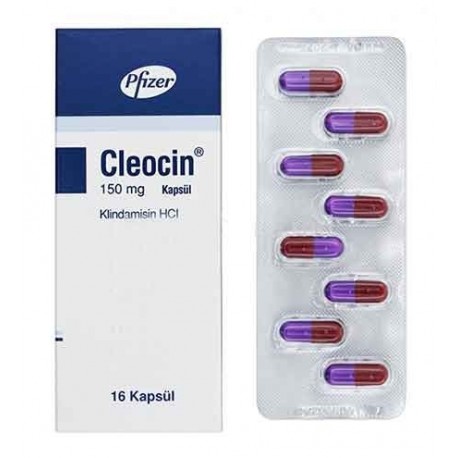 View larger
View larger Cleocin (Clindamycin) 150 Mg 16 Capsules
CLCN5997
New product
BUY MORE PAY LESS
| Quantity | Discount | |
|---|---|---|
| 2 | 5% | |
| 3 | 10% | |
| 4 | 15% | |
| 5 | 20% |
Volume discounts
| Quantity | Discount | You Save |
|---|---|---|
| 2 | 5% | Up to $2.90 |
| 3 | 10% | Up to $8.70 |
| 4 | 15% | Up to $17.40 |
| 5 | 20% | Up to $29.00 |
More info
CLEOCIN 150 mg CAPSULES Taken orally.
Active substance: Each capsule contains clindamycin hydrochloride equivalent to 150 mg clindamycin.
Excipients
Lactose hydride, magnesium stearate, starch, talc, gelatin, erythrosine, Patent Blue V, red iron oxide, FD&C Blue No 2, titanium dioxide
What is CLEOCIN and what is it used for?
CLEOCIN is an oral capsule containing clindamycin (in the form of clindamycin hydrochloride), a lincosamide antibiotic.
Each box is presented in white powder opaque red-violet colored PVC-A1 blister containing 16 capsules.
CLEOCIN is used in the treatment of the following acute / chronic infections caused by bacteria sensitive to clindamycin, if your doctor deems appropriate:
Lower respiratory tract infections: Such as bronchitis, pneumonia, lung abscess
Upper respiratory tract infections: Tonsillitis, pharyngitis (pharyngitis), sinusitis, middle ear inflammation, such as scarlet fever.
Gynecological (female reproductive system) infections
Various skin infections: Such as acne, cellulitis, inflammation of the hair root (furuncle), abscess.
Bone and joint infections: Bone and bone marrow infections (osteomyelitis), joint
inflammations (such as arthritis)
Intra-abdominal infections: Such as peritonitis and abdominal abscess
Some tooth and gum infections: Gum abscess and gingivitis (periodontitis)
CLEOCIN can also be used in the treatment of more serious cases, such as when the infection spreads to the blood (septicemia), inflammation of the inner lining of the heart (endocarditis) or some infections in AIDS patients.
CLEOCIN is effective in the treatment of malaria when used alone or in combination with other drugs. CLEOCIN does not enter the brain and is not suitable for the treatment of serious infections in the brain.
3.How to use CLEOCIN?
Instructions for appropriate use and dose / frequency of administration
Your doctor will decide in what dose and how often you should take CLEOCIN. The dose for adults is 600-1800mg per day, divided into two, three or four equal doses.
Prolonged use can lead to other infections.
Follow your doctor's instructions exactly and never change the dose yourself.
Application route and method
Take CLEOCIN with a glass of water.
Use in children
Use in the elderly
The recommended dosage in children is between 3 and 6 mg / kg every 6 hours, depending on the severity of the infection. Your doctor will decide on the number of capsules your child should take.
Use in the elderly
There is no need for dose restriction in the elderly. It is the same as the dose administered in adults.
Special use cases
Kidney failure:
There is no need for any dose adjustment.
Liver failure:
There is no need for any dose adjustment.
When long-term use is necessary, your doctor may order regular liver, kidney and blood tests.
If you have the impression that the effect of CLEOCIN is too strong or too weak, talk to your doctor or pharmacist.
If you use more CLEOCIN than you should
If you have used more than you should use from CLEOCIN, immediately consult a doctor or the nearest hospital emergency.
Take the medicine blister with you, even if it is emptied.
If you forget to take CLEOCIN:
If you have completely missed a dose of CLEOCIN, inform your doctor.
Do not take a double dose to make up for forgotten doses.
Effects that may occur when treatment with CLEOCIN is terminated
Use CLEOCIN regularly and exactly as your doctor prescribes. Do not interrupt the treatment even if you feel well; Because if the treatment is terminated early, the medicine may not have killed all the germs and the infection may recur.
4. What are the possible side effects?
As with all medicines, CLEOCIN can cause side effects; However, these side effects may not occur in everyone.
If any of the following occur, stop using CLEOCIN and IMMEDIATELY inform your doctor or go to the nearest emergency department:
Sudden sneezing, difficulty breathing, swollen face, eyelid and lips, skin rash
flushing, itching (especially if it affects the whole body)
These are all very serious side effects.
If you have one of these, it means you have a serious allergy to CLEOCIN. You may need urgent medical attention or hospitalization.
All of these very serious side effects are very rare.
If you notice any of the following, inform your doctor immediately or contact the emergency department of your nearest hospital:
• Uncommon severe, prolonged or bloody diarrhea (with severe cramping abdominal pain or fever). This is a side effect that can occur during or after treatment with antibiotics and indicates a serious bowel infection.
Jaundice (seen as yellowing of the skin or whites of the eyes)
Sudden wheezing, difficulty breathing, swelling of the eyelids, face or lips, rash or

